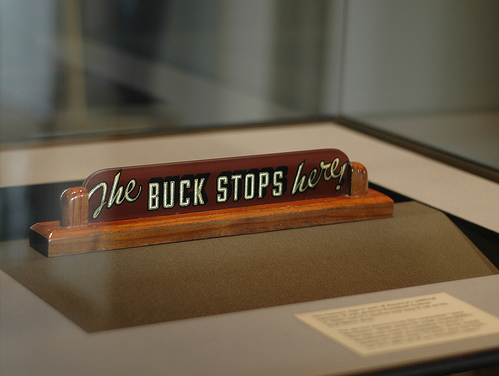American President Harry S. Truman famously had a sign on his desk in the oval office, with four simple words: “The Buck Stops Here”. It was a reminder that the President is the final decision maker, with full responsibility and accountability.
Here in Canada and in other countries based on the Westminster model, our version is called ministerial accountability. Under this doctrine, Ministers are where the buck stops – they have the ultimate responsibility and accountability for their ministry. A more detailed definition, from the Parliament of Canada website:
Ministers are individually responsible to Parliament and the Prime Minister for their own actions and those of their department, including the actions of all officials under their management and direction, whether or not the Ministers had prior knowledge. In practice, when errors or wrongdoings are committed by officials under their direction, Ministers are responsible for promptly taking the necessary remedial steps and for providing assurances to Parliament that appropriate corrective action has been taken to prevent reoccurrence. (emphasis mine)
The media has noted changes in this doctrine in recent years, as noted by the CBC in a telling article under the headline “The new ministerial responsibility: Punish the underlings”. Aaron Wherry in MacLeans also asked “What does ministerial accountability mean anymore?”
Recent news stories cause me to wonder about the relationship between elected MPs and unelected bureaucrats, one where Ministers are publicly critical of their staff. Public servants are unelected and nonpartisan. On the whole, they do an excellent job. Scandals and mis-steps are rare, particularly considering that there are over a quarter-million individuals working in the federal public service.
Press releases are issued daily where a Minister claims credit for the fine work being done by the “Government of Canada”, or more recently, by the “Harper Government”. Rarely do these announcements describe work personally undertaken by a minister – the work is done by hundreds if not thousands of faceless, unelected public servants under the Minister’s leadership and direction.
As the elected representatives of the country and members of Cabinet, ministers are right to take credit for the success of their departments. They are, in effect, the CEO of those organizations. Even the most senior unelected bureaucrats are deputy ministers – by law these individuals act entirely under the management and direction of their Minister. In any event most public servants seem content to diligently deliver results with no expectation of credit or recognition.
Things seem different when problems arise, however.
In reaction to a recent change made by employees of the RCMP, the Minister of Public Safety decried the actions of the “unelected bureaucrats” as “absolutely unacceptable”. He posted on Twitter that he was upset with the decision.
The Minister states that the government is “on your side”, seemingly implying that the RCMP is on some ‘other’ side. Aren’t ministers, as the leaders of the government in the House of Commons, and the bureaucrats, who work for the government, on the same side?
In the private sector, CEOs are rarely critical of their employees – in public, at least. They implicitly know that doing so would lead customers to question their leadership and the unity of their organization. They still maintain discipline within their organizations, but they do so away from the public eye.
Criticism of the public service in the media leads to a downward spiral of decreased trust in government and the public sector more broadly. Public servants are already under fire from the media and the public. The buck should not be passed down and left at the feet of the lowly, faceless bureaucrat.
 George Wenzel was a journeyman public servant and is now working at a not-for-profit – pursuing his passions in what will be his fifth career. He recently completed a two-year secondment to the National Managers’ Community as the Alberta Regional Coordinator. You can find him online at http://about.me/georgewenzel, http://www.govlife.ca, and on Twitter @georgewenzel.
George Wenzel was a journeyman public servant and is now working at a not-for-profit – pursuing his passions in what will be his fifth career. He recently completed a two-year secondment to the National Managers’ Community as the Alberta Regional Coordinator. You can find him online at http://about.me/georgewenzel, http://www.govlife.ca, and on Twitter @georgewenzel.


